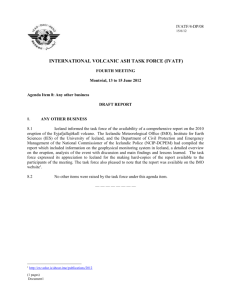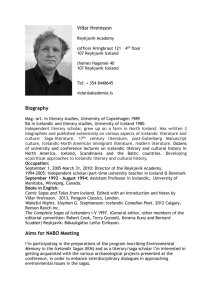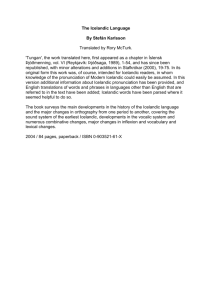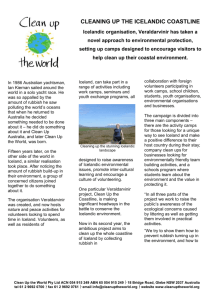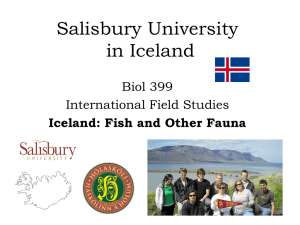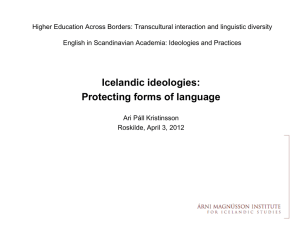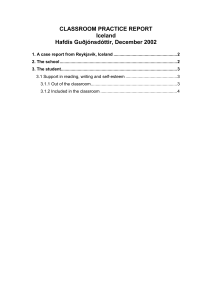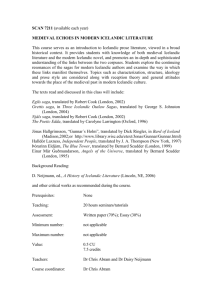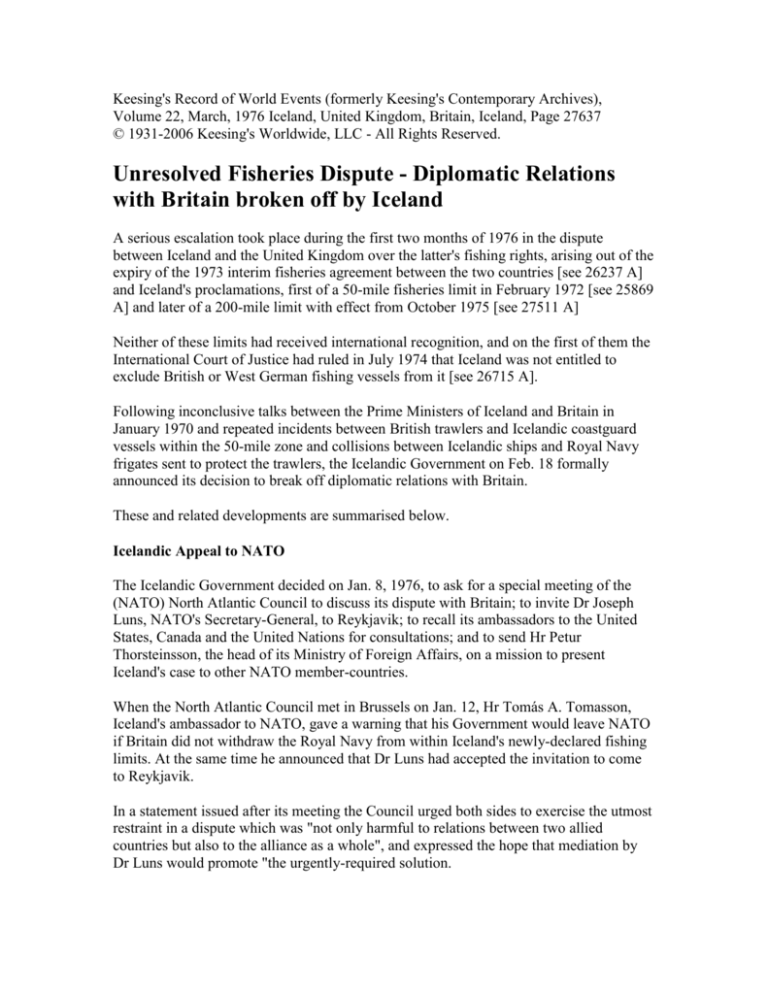
Keesing's Record of World Events (formerly Keesing's Contemporary Archives),
Volume 22, March, 1976 Iceland, United Kingdom, Britain, Iceland, Page 27637
© 1931-2006 Keesing's Worldwide, LLC - All Rights Reserved.
Unresolved Fisheries Dispute - Diplomatic Relations
with Britain broken off by Iceland
A serious escalation took place during the first two months of 1976 in the dispute
between Iceland and the United Kingdom over the latter's fishing rights, arising out of the
expiry of the 1973 interim fisheries agreement between the two countries [see 26237 A]
and Iceland's proclamations, first of a 50-mile fisheries limit in February 1972 [see 25869
A] and later of a 200-mile limit with effect from October 1975 [see 27511 A]
Neither of these limits had received international recognition, and on the first of them the
International Court of Justice had ruled in July 1974 that Iceland was not entitled to
exclude British or West German fishing vessels from it [see 26715 A].
Following inconclusive talks between the Prime Ministers of Iceland and Britain in
January 1970 and repeated incidents between British trawlers and Icelandic coastguard
vessels within the 50-mile zone and collisions between Icelandic ships and Royal Navy
frigates sent to protect the trawlers, the Icelandic Government on Feb. 18 formally
announced its decision to break off diplomatic relations with Britain.
These and related developments are summarised below.
Icelandic Appeal to NATO
The Icelandic Government decided on Jan. 8, 1976, to ask for a special meeting of the
(NATO) North Atlantic Council to discuss its dispute with Britain; to invite Dr Joseph
Luns, NATO's Secretary-General, to Reykjavik; to recall its ambassadors to the United
States, Canada and the United Nations for consultations; and to send Hr Petur
Thorsteinsson, the head of its Ministry of Foreign Affairs, on a mission to present
Iceland's case to other NATO member-countries.
When the North Atlantic Council met in Brussels on Jan. 12, Hr Tomás A. Tomasson,
Iceland's ambassador to NATO, gave a warning that his Government would leave NATO
if Britain did not withdraw the Royal Navy from within Iceland's newly-declared fishing
limits. At the same time he announced that Dr Luns had accepted the invitation to come
to Reykjavik.
In a statement issued after its meeting the Council urged both sides to exercise the utmost
restraint in a dispute which was "not only harmful to relations between two allied
countries but also to the alliance as a whole", and expressed the hope that mediation by
Dr Luns would promote "the urgently-required solution.
Dr Luns arrived in Reykjavik on Jan. 18, and at the end of two days' talks with Hr Geir
Hallgrímsson, the Icelandic Prime Minister, he returned to Brussels with a message for
Mr Wilson, the British Prime Minister, which he handed to Mr James Callaghan, the UK
Foreign and Commonwealth Secretary, on Jan. 19.
Meanwhile the foreign relations committee of the Althing (the Icelandic Parliament)consisting of representatives of all the country's political parties-had on Jan. 16 decided
unanimously to advise the Government to break off diplomatic relations with Britain
because the Royal Navy was "guilty of using dangerous tactics" against Icelandic vessels.
Hr Hallgrímsson announced later the same day that "if London has not recalled its
warships from our waters by Jan. 24, we will consider the breaking of diplomatic
relations" but he added that he could not promise that, if UK frigates were withdrawn,
Icelandic patrol boats would stop cutting the wires of British trawlers and that, if a new
fishing agreement were reached, it would be for a British catch of less than 65,000 tons a
year (as proposed previously). Hr Hallgrímsson's ultimatum was delivered to the British
ambassador in Reykjavik on Jan. 19.
Mr Callaghan in turn announced in Brussels on Jan. 19 that British warships would be
withdrawn from Icelandic waters and that Hr Hallgrímsson would be invited to London
for talks with Mr Wilson.
The North Atlantic Council welcomed this decision at a special session on Jan. 20,
declaring that it "fully approved of the solution obtained and thanked the two
governments concerned, particularly the United Kingdom".
Mr Roy Hattersley, Minister of State at the (UK) Foreign and Commonwealth Office,
confirmed in the House of Commons on the same day (Jan.20) that the frigates would
return to within the 200-mile limit if harassment of British trawlers by Icelandic gunboats
was resumed.
Hr Hallgrímsson, on the other hand, said later on Jan. 20 that, although diplomatic
relations would "not now" be broken off, Iceland's patrol vessels would continue to
"uphold Icelandic law inside the 200-mile limit".
Two days later the Icelandic Prime Minister announced that his Cabinet had unanimously
agreed that he should accept Mr Wilson's invitation.
It was reported that this decision was supported by all members of the Althing’s foreign
affairs and fisheries limits commissions except the People's Union (the left-wing party
heavily influenced by Communists), which held 11 out of the Althing’s 60 seats.
During talks held in London on Jan. 24–27 between Hr Hallgrímsson, Mr Wilson and Mr
Callaghan, and also between conservation experts from both sides, Mr Wilson instructed
all British trawlers off Iceland on Jan. 26 to suspend fishing because of a warp-cutting
incident on that day; four hours later, however, he gave the trawlers permission to resume
fishing but instructed them to remain as close together as possible and to haul in their nets
if challenged by Icelandic coastguard vessels.
The incident was reported to have occurred after Mr Fred Peart, the UK Minister of
Agriculture, Fisheries and Food, had (with Mr Wilson's approval) ordered trawler
captains to accept without demur-any commands given to them by Icelandic gunboats. As
one of the trawlers refused to stop fishing when ordered by the Icelandic coastguard
vessel Tyr, the latter cut both hawsers of the trawler's nets, which were thus lost.
A fleet of about 40 British trawlers was on Jan. 28 reported to be boxed in and unable to
fish as three Icelandic gunboats stood by, ready to cut the trawl wires, while there was no
protection by Royal Navy vessels, and a trawler which did not comply with an Icelandic
order to stop fishing had its gear cut away by the Tyr on Feb. 2.
After the ministerial talks in London, Mr Peart advised trawler skippers to abstain from
fishing until midnight on Feb. 4 if subjected to pressure by Icelandic gunboats, but
thereafter to "fish in the usual way in the designated areas in International waters".
Mr Peart subsequently announced in a written parliamentary reply on Jan. 29 that the
British Government had decided to compensate the trawlermen for loss of earnings,
estimated to amount to about £100,000, for the period from Jan. 24 to Feb. 4.
At the end of the talks between Mr Wilson and Hr Hallgrímsson on Jan. 27 it was
officially stated in London that both Prime Ministers would be reporting to their
respective Governments and that they "expected to be in touch again shortly".
Mr Wilson added in the House of Commons on Jan. 28 that it remained "of great
importance that nothing further should happen on the fishing banks to heighten tension"
and that "In the last two hours" he had "found it necessary to re-emphasize this to Hr
Hallgrmsson". He also said that the scientists had not reached agreement on what should
be the total catch on conservation grounds. He continued: "We have made clear that any
continued interference … must be met by our telling the Icelandic Government that we
are not prepared to accept a situation contrary to what we have agreed with them in the
matter of cooling it. If necessary we shall have to take action to protect our ships against
harassment and interference."
While the Icelandic Government was still considering the outcome of the London talks,
Hr Olafur Johannesson (the Minister of Justice and acting Foreign Minister) said on Feb.
1 : "There is no, or hardly any, basis for agreement." He gave as three reasons (i) that
Britain had in 1978 been given a two-year interim period in which to get used to living
without fish from Iceland's banks; (Ii) that the British had used armed force against
Iceland; and (iii) that the state of Iceland's cod stock was so grave that there were no fish
left for the British.
Hr Hallgrímsson announced in the Althing on Feb. 8 that the proposals made by Mr
Wilson during the talks held in London were unacceptable because they did not recognize
the preferential treatment which should be accorded to Icelandic fishermen in view of the
importance of fisheries to Iceland, accounting for 80 per cent of the country's total
exports.
Hr Hallgrímsson said that Mr Wilson had been prepared to make a number of
concessions in return for an agreed British catch, (i) conceding that Iceland should have
the right to determine the amount of cod which could be caught without endangering
stock and (ii) asking for a fixed 28 per cent of this total allowable catch, with a further
10,000 tons suggested for other kinds of fish. Hr Hallgrímsson added, however, that he
had sent a note to the British Government offering talks about a short-term agreement for
"something like three months".
Mr Callaghan stated on the same day that the British Government was "of course" ready
for further talks on a short-term agreement, and he confirmed that Britain had proposed
that its cod catch should be reduced to 28 per cent of a total to be fixed by Icelandic
conservation experts. He added that he had suggested an independent mediator but that
this suggestion had been turned down by Iceland, and that he had proposed British aid to
help Icelandic fishermen over a period of hardship and lower catches. At the same time
he said that any further warp-cutting incidents would result in the automatic return of
British frigates to the fishing grounds.
On Feb. 4 Mr Callaghan explained in the House of Commons that during the London
talks the Icelandic Government had not been in a position to negotiate and had even been
unable to agree to temporary arrangements to cover the five-day period during which
they (the Icelandic Government) were considering the results of the talks.
In London the Foreign Office announced on Feb. 6 that the British trawler industry had
agreed to limit the number of vessels in the waters off Iceland to 105 (against 139 under
the 1973 agreement), and the annual cod catch to 85,000 tons.
Earlier incidents between British naval vessels and the Icelandic gunboat Thor on Dec.
11, 1975 [see page 27513], had led to an appeal by the Icelandic Government to the UN
security Council to call on Britain to refrain from the use of force in Icelandic waters, and
this appeal was debated in the Council on Dec. 15.
Hr Ingvi Ingvarsson, the Icelandic permanent representative at the UN, claimed that a
200-mile fisheries limit, as proclaimed by Iceland, was in accord with the view of the
overwhelming majority at the 1975 Law of the Sea Conference [see 27211 A] and that it
was vital for Iceland to insist on fish conservation, in particular of cod.
Mr Ivor Richard, the UK permanent representative, said in reply that there should be
negotiation and not confrontation; that the collisions had been caused by the manoeuvring
of an Icelandic gun-boat against unarmed British vessels seeking shelter in Icelandic
waters from severe weather; that Iceland bore responsibility for the damaging effect of
overfishing; that Britain was ready to reduce its catch considerably; but that Iceland was
treating all the fish as its own and calling on foreign fishermen to bear the entire burden
of conservation measures.
Hr Hallgrímsson issued a warning against the dangers of continued armed confrontation
in his New Year message on Dec. 31, 1975.
He said in particular: "We should not expect a quick solution to our dispute with Britain.
Once they put an end to their military presence in Icelandic jurisdiction and their trawlers
stop illegal fishing, a solution can be found-but the British Government will have to show
its willingness towards this end." Icelanders, he said, knew that they had both right and
reason, as well as time, on their side; nevertheless, all means should be used to prevent
illegal fishing and the use of British warships, during which time "we should, above all,
keep our tempers."
The Icelandic Prime Minister also disclosed that in a letter to Mr Wilson he had stated
that "the continued unlawful fishing by British trawlers under protection of the Royal
Navy and ramming of Iceland's coastguard vessels might lead to a loss of human lives,
and will damage seriously and permanently the relations between Iceland and Britain".
Late in December 1975 and during January 1976 several further collisions took place,
with different versions of their causes being given by the two sides, and formal protests
being made on a government-to-government basis on a number of occasions.
In a collision between the British frigate Andromeda and the Tyr on Dec. 28, 1975, both
vessels were slightly damaged, while Icelandic accusations that the frigate had
"deliberately rammed" the Tyr were dismissed by the UK Ministry of Defence. The
Andromeda collided with the Icelandic gunboat Thor on Jan. 7, when the Thor was holed
and the frigate dented. The frigate Leander and the Thor collided on Jan. 9, damage being
caused to both ships. On Jan. 19 the Icelandic coastguard vessel Aegir holed a British
trawler above the waterline.
Following two warp-cutting incidents caused by the Icelandic converted trawler Baldur
and the Tyr on Feb. 5, the British frigates Juno and Diomede were sent into the disputed
fishing waters on the same day. The Icelandic Government protested against this decision
on Feb. 6 "in the strongest possible terms", and Mr Hallgrímsson expressed the hope that
NATO would impress upon Britain that it was in her best interests to withdraw the
frigates. He also announced that the Icelandic Government had withdrawn its offer of
talks on a short-term agreement, stating: "No basis exists for any negotiating talks with
Britain."
Further collisions occurred during the next two weeks.
The Tyr collided with the Juno on Feb. 6 without causing serious damage to either vessel,
but it subsequently cut the warps of three trawlers. When the Baldur cut the trawling
wires of a UK trawler on Feb. 11 the British Ministry of Defence claimed that it had been
done in such a way as to "endanger the lives of the trawler crew". Following another
collision on Feb. 13, the master of the Baldur accused the captain of the Diomede of
having "tried to sink" his ship. In a collision between the Thor and the frigate Lowestoft
on Feb. 18 the latter sustained a six-foot-long dent. Further warps were cut on Feb. 19 by
the Thor and by the gunboat Aegir, a British trawlerman being hurt by a severed cable.
In reports by the icelandic coastguard and by Dr Jon Jonsson (the director of Iceland's
Marine Research Station and chief scientific adviser to Hr Hallgrímsson during the
London talks), submitted to Hr Matthias Bjarnason, the Minister of Fisheries, on Feb. 11,
it was claimed that 42 British vessels were fishing in a conservation area banned to all
ships, and that their catches were above the total for the previous year. In London,
however, it was stated that the area was to have been closed only for two months from
April 1, whereas Iceland had closed it unilaterally from Feb. 1.
Mr Callaghan declared in Cardiff on Feb. 18 that the British Government was willing to
allow NATO observers on board British frigates so that it could be established that the
Royal Navy was not responsible for "dangerous ramming incidents". However, alter this
offer had been formally conveyed to the Icelandic Government by Dr Luns, it was
announced on Feb. 25 that Hr Tomasson had informed the North Atlantic Council that his
Government had rejected it-reportedly because its acceptance would mean the tacit
admission by Iceland that the British frigates could stay in the disputed area.
The Althing’s foreign relations committee decided on Feb. 17 that Iceland should break
off diplomatic relations with Britain, and the Icelandic Government endorsed this
decision on the following day, making its formal announcement to that effect on Feb. 19.
Hr Hallgrímsson gave as the reasons for this decision (i) that Britain had again sent Royal
Navy ships inside Iceland's 200-mile limit because of the cutting of warps of a British
trawler which, he claimed, had been inside an Icelandic conservation area and had
refused to stop fishing after a warning; (ii) that there had been "continued ramming" of
Icelandic coastguard boats by British frigates; and (iii) that the British fishing fleet had
deliberately sailed into a cod-breeding ground which Iceland regarded as closed to
everyone.
Mr Peart announced the Icelandic decision in the House of Commons on the same day in
the course of a debate on the fishing industry and added that France would look after
Britain's interests in Iceland and Norway after Iceland's in the United Kingdom.
This diplomatic breach was the first between one NATO member-country and another,
and the most serious divergence of views between two NATO partners since the dispute
between Greece and Turkey over Cyprus in 1974 [see 26709 A].
The UK Foreign Office declared in a statement later on Feb. 19 that Britain remained
ready to negotiate an agreement with Iceland" at any time, at any place, at any level".
In Brussels the North Atlantic Council expressed "deep regret" at this development and
added that Dr Luns remained "ready and willing to do his utmost to assist to bring about a
satisfactory solution for both sides". (Mr Wilson had seen Dr Luns again in London on
Feb. 11, after the latter's return from a visit to Washington, and Dr Luns had undertaken
to convey Mr Wilson's views on the dispute to the Government of Iceland.)
In Iceland Hr Einar Ágústsson, the Foreign Minister, said on Feb. 20 that the US military
base at Keflavik would not be affected by the severance of diplomatic relations between
Iceland and Britain.
At the end of an all-night debate in the Althing on the conduct of the "cod war, by Hr
Hallgrímsson's Cabinet, the Icelandic Government was on Feb. 24 given a vote of
confidence by 41 votes to 18 (of the members of the three left-wing opposition parties).
An appeal to the British Government to withdraw its warships from the disputed waters
around Iceland was made on Feb. 29 by the Nordic Council (embracing Denmark, the
Faeces, Finland, Iceland, Norway and Sweden) at a meeting of the Council's presidium in
Copenhagen.
Mr Kenneth East, who had been Britain's ambassador in Reykjavik for the past 10
months, said before his return to London (on March 1) that he was satisfied that "no stone
had been left unturned in seeking a formula that would be acceptable to the Icelandic
Government, provided only that a British cod fishery off Iceland could remain a viable
enterprise". He added: "The problem is presented in Iceland as though it were a question
of Britain destroying Iceland's capacity to live. But the amounts of fish in dispute are not
a matter of survival but of margins of advantage, important margins which both sides
would like to have, but nevertheless margins."
Following the severance of diplomatic relations between the two countries, dangerous
collisions between their respective vessels continued to occur.
Several wire cuttings were effected by the Baldur and the Tyr on Feb. 23; the Thor and
the frigate Yarmouth collided twice on Feb. 24, when the Thor lost part of its bridge
structure; and the Yarmouth hit the Baldur "almost amidships" on Feb. 28.
Three days earlier it had been reported that as a result of increasing pressure by Icelandic
vessels almost half of some 40 British trawlers had moved out of the 200-mile zone.
An attempt to assess the importance of the Icelandic fishing grounds to Britain was made
in The Times on Feb. 2, when it was stated that" on the face of it the present deadlock
[looked] unbreakable".
In the article it was stated: "To keep the whole matter in perspective it should be realized
that nearly 70 per cent of fish landings by British vessels are caught in waters around the
United Kingdom. The distant fishing grounds like Iceland and Faroe, the Barents and
Norwegian seas, and along the coasts of Newfoundland, Greenland and Labrador provide
just over 30 per cent of the total United Kingdom catch, but over 60 per cent of our cod."
In trying to assess the losses which would be produced by "severe cuts" in catch rates, the
article quoted a spokesman for the British Trawlers' Federation, who thought that they
would be "incalculable", his view being that British trawlers fishing near Iceland "cannot
fish elsewhere, so there would be a capital loss, the loss of ships, the loss of the fish
which would mean higher imports and loss to the balance of payments, as well as the loss
to supporting industries".
Being "by far the biggest producer of fish in the European Community", with "almost
7,000 vessels", Britain would be weakened in its bargaining position within the EEC
when European fleets were restructured in the light of the 200-mile limit which was
expected to be agreed at the forthcoming session of the UN Law of the Sea Conference.
It was also pointed out that Iceland's "great inflation problem" [see 27511 A] had been
caused partly by the collapse of its fish market in the United States and partly by the
quadrupling of the price of fuel oil (all of which came from the Soviet Union), whereas
the price of Icelandic fish had since 1973 increased by only 57 per cent, so that Iceland
had a substantial balance-of-payments deficit with the Soviet Union.
Various statements on catches and losses were made on other occasions.
Mr Eric Thundercliffe, fishery liaison skipper on the frigate Leander, was on Jan. 9,
1976, quoted as saying that recent British catches of cod were equivalent to an annual
quota of 130,000 tons (as provided under the agreement which expired on Nov. 13,
1975), i.e. twice as much as the Icelandic Government had then offered to concede under
any new agreement.
The British Trawlers' Federation, however, was on Feb. 19 reported to estimate that its
members had lost £9,400,000 in the previous 12 months. On Feb. 29 a spokesman for the
Federation said that in the previous week no trawler had made a profit, and some had lost
£100,000 on a trip.
Cod imports during 1975 were said to have cost Britain £18,000,000.
According to a statement in the House of Commons on Feb. 13 by Mr Edward Bishop,
Minister of State for Agriculture, Fisheries and Food, the total cost of civilian ships
chartered by the British Government to help to protect British trawlers off Iceland had
between Nov. 11, 1975, and Feb. 11, 1976, reached £780,000.
It had been announced in Reykjavik on Dec. 10, 1975, that the Icelandic Government had
rejected an application by the Soviet Union for port facilities for the latter's long-distance
fishing fleet. A spokesman for the Icelandic Ministry of Fisheries said that for more than
50 years Iceland's policy had been to refuse all facilities in the country to foreign
fishermen.-(Times -Daily Telegraph - Guardian - Financial Times - International Herald
Tribune - Le Monde - UN Information Centre, London)(Prev. rep. 27511 A)
© 1931- 2008 Keesing's Worldwide, LLC - All Rights Reserved.

